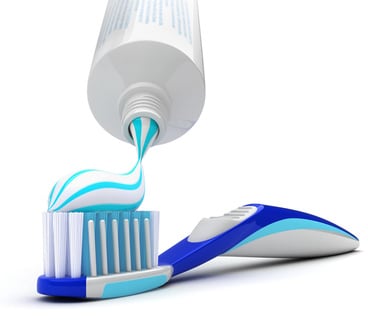
It seems like those ancient Egyptians were big on oral hygiene and it is said that they started using a paste to clean their teeth as far back as 5000 BC, even before toothbrushes were invented. It is known that the Ancient Greeks and Romans also had used some form of toothpaste, or a tooth cleaner.
Though our ancient ancestors were most likely concerned with the same oral hygiene issues that we have today – cleaning the teeth and gums from food particles and keeping the breath fresh, the ingredients were quite different and varied. It has been reported that ancient Egyptians used ingredients like ashes, burnt eggshells, pumice and even a powder made of ox hooves. The Greeks and Romans, who liked even a more abrasive teeth cleaner, used crushed bones and shells, with a little powdered charcoal and bark to help freshen the breath. Historians suggest that the world’s oldest-known actual formula for toothpaste was created by Egyptians, in the year 4 AD. They used crushed rock salt, mint, dried flowers, and pepper mixed together to create an abrasive powder. The people in China and India, who until this day incorporate exotic herbs in their recipes, first used toothpaste around 500 BC and used ingredients such as ginseng, herbal mints and salt.
In the year 1780, it was know that people cleaned their teeth with a powder that was mostly made, oddly enough, of burnt toast! Early versions of tooth cleansers in the 1800’s were in powder form and included ingredients such as soap, chalk and ground charcoal. In 1873, Colgate was the first to mass-produce toothpaste in jars, and then, in the 1890’s, produced it in tubes, similar to what we know today.
By the early 1900’s, in the U.S., toothpaste was still only used occasionally, despite country-wide dental problems, until a well-known advertising man named Claude Hopkins, helped its use become a daily habit. Being know for turning unknown products into household names (i.e. Quaker Oats), he was commissioned to create a national ad campaign for Pepsodent Toothpaste. His winning ad scared consumers about a dangerous film lurking in their mouth that would rob teeth of their whiteness, unless they used Pepsodent Toothpaste religiously. This successful campaign had Americans jumping on the daily tooth brushing with toothpaste bandwagon! The rest is history.
Fluoride, known for its cavity-fighting benefits, was introduced into toothpaste in 1914. Up until 1945 toothpaste contained soap, but was then replaced by other ingredients to make it more like the smooth paste or emulsion that we use today.
Park View’s Point of View
At Park View Pediatric Dentistry, we place a great deal of importance on preventative dentistry, always striving for our patients to have a cavity-free visit. We promote brushing two times a day for two minutes with a good toothpaste that has a flavor that that your child will enjoy. There are many wonderful, effective toothpastes on the market today. We strongly recommend a toothpaste containing fluoride, which is proven to reduce cavities. This is especially important if you are in an area where the public water does not contain fluoride or you are choosing to drink bottled water that does not contain fluoride. We often discuss toothpaste options and benefits with our young patient’s parents to find the right family choice. In any case we want parents to promote healthy oral habits and lots of brushing, while you squeeze those tubes away!
We’ve come along way from the ancient Egyptians. Here’s to continuing the history of great oral health with the use of toothpaste.
You can contact us at:
Park View Pediatric Dentistry
212-879-6518
www.ParkViewPedDent.com
